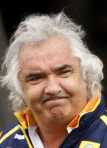 Comebacks. Who needs them? Not Michael Schumacher. Thankfully.
Comebacks. Who needs them? Not Michael Schumacher. Thankfully.
Yes, the return of the seven-time world champion would have put extra traseros on seats in Valencia at this weekend’s European Grand Prix. In fact ticket sales rose by 10,000 when news broke of his impeding substitution for Ferrari regular Felipe Massa.
And yes, it would have been fleetingly interesting to see him mixing it with the Hamiltons, Alonsos, Vettels and the rejuvenated Buttons and Webbers.
But what of KERS, slicks, 2009 aerodynamic packages? Not to mention a prancing horse which is a lot more temperamental than the one he saddled in 2006.
What did he really have to gain? Was there anything left to prove? To us, to himself?
When the comeback was first mooted, Schumacher’s manager Willi Webber said it best. “When Michael was racing he would get as close to perfection as possible,” he observed. “In this case [the comeback], it would not be perfection – it would be a gamble – and that’s not Michael’s style.” Indeed it’s not.
Schumacher’s preparation was meticulous. So conditioning himself physically, mentally and technically for a return to the 2009 grid in the space of a few weeks, was way out of his comfort level.
And while his willingness to help out an old friend was noble, there wasn’t a realistic chance of him being competitive. And that’s not Michael’s style either.
In announcing his final decision, Schumacher said: “I am disappointed to the core. I really tried everything to make that temporary comeback possible, however, much to my regret, it did not work out.”
There are some of us who are relieved to the core that a stiff neck, the legacy of a motorbike accident earlier in the year, forced an about-turn.
What’s better? A champion bowing out in his pomp or a pale shadow poodling around with the tail-end charlies? It might be acceptable in touring cars, rally raids or celebrity karting but not in modern F1.
Boxers, particularly heavyweights, climb back through the ropes in the name of mounting debt dressed up as sporting desire. Most of those contests end in pity and despair.
And there are those who came back once too often having long since succumbed to the onset of Parkinson’s Disease. Just ask Muhammad Ali – if you still can.
Having quit after regaining his world title from Leon Spinks in 1978, Ali re-laced his gloves three years later at the age of 39 and was badly beaten by Larry Holmes.
He once floated like a butterfly. His care workers are now left propping up a trembling wreck of a human being. The sting has long gone.
And what of Joe Louis? Considered by many to be the greatest heavyweight of all time, he held the crown from 1937 to 1949. Massive tax debt led him into battle long after his shelf life.
In 1950, a year after his retirement and two years since his last fight, he lost to Ezzard Charles. A large purse was offered to fight champion Rocky Marciano the following year.
It was a contest Marciano didn’t want. Conscious of Louis’ financial plight, he accepted. Louis ate canvas in the eighth round and retired for good.
George Foreman re-entered the ring in 1994 at the age of 45. He knocked out Michael Moorer to reclaim his world title after a 20-year gap. He finally called it a day when he lost to Shannon Briggs in 1997. But, even then, he threatened comebacks in 1999 and, at the age of 55.
 Sugar Ray Leonard was another man with a heavy addiction to comebacks. He made four between 1976 and 1997. His dubious reward today is the ability to count his brain cells on one hand.
Sugar Ray Leonard was another man with a heavy addiction to comebacks. He made four between 1976 and 1997. His dubious reward today is the ability to count his brain cells on one hand.
Elsewhere, sport is littered with failed second comings. Sportsmen who returned as spent replicas.
Men like Bjorn Borg. The Swede retired aged 26 with 11 grand slam titles in his locker. He founded a fashion company, flirted with hard drugs and soft-in-in-the-head relationships, before attempting a toe-curling comeback in 1991. He arrived armed with his wooden Donnay racket. Wood v graphite? Go figure.
He never won another match in 10 tournaments.
Then there’s Mark Spitz. The American made history with seven Olympic gold medals in the pool at the Munich in 1972, a record only eclipsed by Michael Phelps in Beijing last year. Spitz tried out for the US national team in 1991, aged 41. He was two seconds outside the qualifying time for Barcelona 92.
Even Pele, after taking Brazil to three World Cups, was coaxed out of retirement to play saar-kur for the New York Cosmos.
East German figure skater Katarina Witt collected two Olympic golds, four world titles and six European crowns. She quit in 1988 at 23 but returned six years later for the 1994 Games at Lillehammer. She finished seventh.
Martina Hingis took an early bath at 23. In 2006, the former world No1 was back and played two seasons winning three tournaments and the Australian Open mixed crown. Her homecoming was brought to a premature by a positive test for cocaine during Wimbledon in 2007.
Of course there will always be exceptions. Some glorious.
In Schumacher’s world there is Niki Lauda. The Austrian survived a fiery, near-fatal shunt at the 1976 German Grand Prix to win the world title the following year. The Austrian then retired, flew planes, got bored, oversaw the destruction of his business empire, and returned to land a third title in1984.
Michael Jordan, came back to basketball after two seasons of playing baseball badly to inspire the Chicago Bulls to three consecutive NBA titles. Lester Piggott cajoled a string of winners after a five-year break at Her Majesty’s behest on tax charges.
And of course there is Lance Armstrong. Diagnosed with testicular cancer in 1996, he won the Tour de France three years later and added six more before retiring in 2005. This year, aged 37, he came back again, and finished third.
In Schumacher’s case, I prefer to remember him as he was in 2006, signing off at the Brazilian Grand Prix with one last flourish of his awesome talent at the controls of a Formula One car.
His qualifying was compromised by a fuel-pressure failure, and, in the race, a puncture after nine laps dropped him drop to 19th. His response was to drive the sidepods off his Ferrari to finish fourth.
It was a fitting finale. An encapsulation of the determination that had defined his career.
“You know the song ‘My Way’? I’d say that fits the way I feel,” he said afterwards.
His way was not always to take the moral high road. He mixed utter brilliance with outbreaks of questionable sportsmanship. The archetypal flawed genius, his entries in the record books will always carry an asterisk of controversy.
Variations on the “Schumacher Returns to F1” story will continue to be written. For there is something of the obsessive about sports men and women.
The same ferocious drive that got them to the top in the first place, lures them back when they are clearly past their best. As does the succor of adulation.
Sporting greats contemplating a career reboot will do well to heed the advice of The Beatles, who disbanded in 1970 and never reformed.
Let it be.
Read Full Post »
 For the second time in as many weeks, Rory McIllroy has snatched capitulation from the jaws of victory.
For the second time in as many weeks, Rory McIllroy has snatched capitulation from the jaws of victory.









 So footballers’ wives do have some dignity after all.
So footballers’ wives do have some dignity after all. Buried deep in the sordid details of Formula One’s ‘Crashgate’ is a raft of questions left unanswered.
Buried deep in the sordid details of Formula One’s ‘Crashgate’ is a raft of questions left unanswered. As for Briatore, not only is he staring at a life ban from F1, but there is every prospect that his
As for Briatore, not only is he staring at a life ban from F1, but there is every prospect that his  Comebacks. Who needs them? Not Michael Schumacher. Thankfully.
Comebacks. Who needs them? Not Michael Schumacher. Thankfully. Sugar Ray Leonard was another man with a heavy addiction to comebacks. He made four between 1976 and 1997. His dubious reward today is the ability to count his brain cells on one hand.
Sugar Ray Leonard was another man with a heavy addiction to comebacks. He made four between 1976 and 1997. His dubious reward today is the ability to count his brain cells on one hand.